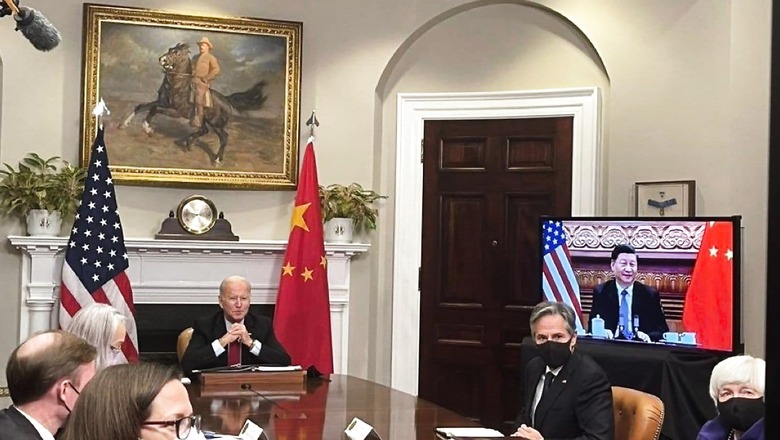
views
The sixth plenary the 19th Central Committee of Communist Party of China held from November 8-11 adopted the third ever ‘historical resolution’ anointing Xi Jinping as the Paramount leader or more accurately the new Emperor for life. That done, the Chinese strongman turned to a ‘mundane’ earthly matter—meeting his American counterpart, but only virtually.
However, before turning to the summit, it may be in order to examine the implications of these momentous internal developments. Earlier Xi had put the world on notice about the arrival of China—aggressive, expansionist and revisionist—by burying the Deng Xiaoping era strategy of “hide your claws, bide your time”.
He dealt another body blow to the legacy of Deng by abandoning his “to get rich is glorious” mantra in favour of “common prosperity” ostensibly to rectify the glaring wealth disparities that have crept into the society. The real reason could as well be the desire to cut business tycoons like Jack Ma to size, given their growing clout. He seems to be following the playbook of President Putin, who has successfully brought the Russian oligarchs to heal. It is evident that Xi’s China is lurching to a Maoist left. What is still unclear is if it heralds the beginning of ‘Cultural Revolution 2.0’ ? In any event, capitals near and not so near are fretting over the implications of the formal ‘coronation’ of Emperor Xi, who wants to make history for ushering in the “great rejuvenation of the Chinese nation”.
The Taiwan Tangle
Topmost on his unfinished business is the ‘breakaway’ Taiwan. While paying lip service to peaceful reunification, Beijing is doing everything possible, short of triggering a conflict, to coerce Taiwan into submission. Violation of Taiwan’s ADIZ (Air Defence Identification Zone) and intrusions close to its maritime territory, simulating an invasion with fighter jets, anti-submarine aircraft and combat ships have become a routine affair. “Since 2020, People’s Liberation Army aircraft and vessels have markedly increased their activity in the Taiwan Strait, with almost daily intrusions,” says President Tsai Ing-Wen, who has prioritised military modernisation of Taiwan.
China dispatched more than 200 fighter jets over four days, the highest-ever, around Taiwan’s National Day.
The White House Press Secretary termed Chinese military manoeuvres near Taiwan as “provocative … which is destabilising, risks miscalculations and undermines regional peace … we will continue to assist Taiwan in maintaining a sufficient self-defence capability.” In August, the Biden administration had cleared sale of military hardware worth USD 750 million to Taiwan that includes self-propelled howitzers and precise GPS-guided munitions.
Earlier in the month, Shi Yi, PLA spokesperson, justified the exercises and decried the repeated collusion between the US and Taiwan as “the largest source of trouble” for security and stability in the area.
“China is much less risk averse to enter into a conflict than thought earlier,” observed Paul Haenle, Director, Carnegie-Tsinghua Center, Tsinghua University Beijing, earlier this month. He added that there was a feeling in the US that Taiwan is being squeezed by China and sympathy for its plight was growing. All the same the US still maintained a one China policy and did not support Taiwan’s independence.
But American sympathy alone would not be enough to save Taiwan should China decide to go for its jugular. Taiwan is no pushover. But without prompt countervailing military intervention by the US and allies Taipei may not be able hold its own for too long. Australian Defence Minister Peter Dutton was upfront—“It would be inconceivable that we wouldn’t support the US in an action if the US chose to take that action.”
Would Washington? The US has adopted a policy of “strategic ambiguity”. The White House spokesperson recently reiterated that the US “will continue to support Taiwan’s self-defense, and we will continue to oppose any unilateral changes to the status quo”. This is neither assurance enough for Taipei nor a deterrent enough for Beijing which regards Taiwan as a ‘core issue’ which brooks no compromise.
The unstated understanding was that the US would act if a conflict was triggered by Beijing so long as Taipei did not provoke one, for example by declaring independence. However, few observers would wager their money on a timely and effective American military response. Nonetheless this has become the foremost contentious issue between the two big powers and as expected figured prominently in the first virtual summit between Biden and Xi on November 15.
US, China Divide is Expanding
As Vice President during the Obama years, Joe Biden has had a number of meetings with (Vice President and) President Xi Jinping. In various interviews he has remarked, “I’ve spent more time with Xi Jinping, at least before we got out, than any world leader” and that “I know him pretty well.”
Even though Xi addressed Biden as “my old friend” at the beginning of the three-and-a-half hour-long virtual meeting, he had hitherto not displayed any particular enthusiasm in meeting his American counterpart. In fact even this meeting was proposed by the American side. A lot seems to have changed in just four years. Merely three months into the Trump Presidency, Xi had travelled to Florida to meet him in April 2017.
Meanwhile the Chinese leader has significantly consolidated his position. His word is law in China today. Biden on the other hand is struggling with a high disapproval rating of 53 per cent (41 per cent in favour) as per a recent Washington Post poll. His detractors opine that he is soft on China but that the strong anti-China sentiment in the country, including the US Congress, has hemmed him in.
That criticism appears excessive though some amount of ambivalence towards China can be discerned. The Biden Administration like its predecessor is serious about technology denial and preventing China from grabbing high-tech companies. Primacy is being given to the Indo-Pacific vision and two Quad summits have been held. The AUKUS military agreement has been concluded. At a public function last month, Biden even spoke of a ‘commitment’ to defend Taiwan if attacked by China. The White House quickly clarified that there was “no change in our policy”.
“The meeting is wide-ranging, in-depth, candid, constructive, substantive and productive. It helps increase mutual understanding,” tweeted the Chinese official spokesperson after the Xi-Biden summit.
In his opening statement Xi remarked, “We should each run our domestic affairs well” (shorthand for get your house in order and stay out of our affairs?) and that both sides “should respect each other”.
President Biden, according to the White House read out, reiterated that the US would “stand up for its interests and values and … advance an international system that is free, open, and fair … He raised concerns about the PRC’s practices in Xinjiang, Tibet, Hong Kong … (as well as) unfair trade and economic practices.” He underscored the US commitment to “one China” policy and her strong opposition to “unilateral efforts to change the status quo or undermine peace and stability across the Taiwan Strait”. Expectedly they covered the climate crisis as also the regional challenges, “including DPRK, Afghanistan, and Iran”.
It does appear from the White House account that the conversation was candid and wide-ranging. Both sides stressed the importance of regular communication and not allowing differences or competition to “veer into conflict”.
It is obvious that neither side wants conflict. Yet, the divide between the nations is wide and expanding. Also, China is convinced that it is a rising power while the US is weakening and is playing for time. The Biden administration views China as a big competitor but does not want disengagement and is speaking of 3Cs— competition, confrontation and cooperation.
It is moot if the US can still set the agenda and expect other nations, particularly China, to follow suit. Hopefully, it will not be a case of ‘Biden proposes, Xi disposes!’
The author is Former Envoy to South Korea and Canada and Official Spokesperson of the Ministry of External Affairs. The views expressed in this article are those of the author and do not represent the stand of this publication.
Read all the Latest Opinions here



















Comments
0 comment